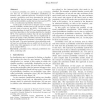163 search results - page 5 / 33 » Representing Aggregators in Relational Probabilistic Models |
ENTCS
2006
13 years 7 months ago
2006
We investigate the construction of linear operators representing the semantics of probabilistic programming languages expressed via probabilistic transition systems. Finite transi...
PKDD
2009
Springer
14 years 2 months ago
2009
Springer
Probabilistic relational models are an efficient way to learn and represent the dynamics in realistic environments consisting of many objects. Autonomous intelligent agents that gr...
JMLR
2010
13 years 2 months ago
2010
The paper analyzes peculiarities of preprocessing of learning data represented in object data bases constituted by multiple relational tables with ontology on top of it. Exactly s...
KDD
2012
ACM
11 years 10 months ago
2012
ACM
Historical prices are important information that can help consumers decide whether the time is right to buy a product. They provide both a context to the users, and facilitate the...
SDM
2010
SIAM
13 years 9 months ago
2010
SIAM
A relational probability tree (RPT) is a type of decision tree that can be used for probabilistic classification of instances with a relational structure. Each leaf of an RPT cont...

